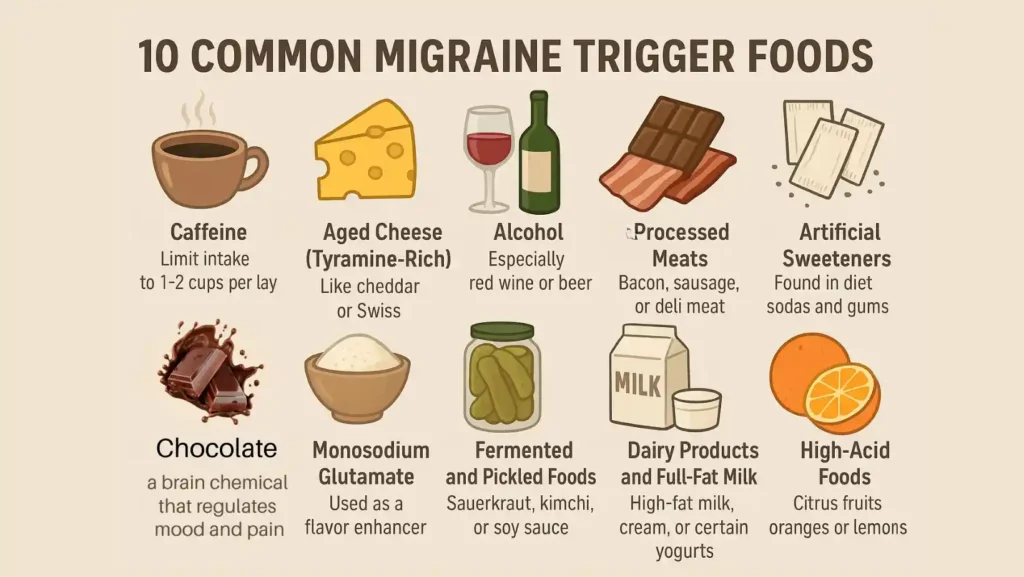Foods that trigger migraines are more common than most people think. For many migraine sufferers, what’s on their plate can be the silent reason behind that throbbing headache that ruins the day. Certain ingredients affect brain chemicals, blood vessels, and nerve pathways that lead to pain.
While triggers vary for each person, researchers have identified several foods and drinks that raise the risk. Understanding which foods cause migraines and knowing what to eat instead can make a major difference in reducing attacks.
Table of Contents
ToggleUnderstanding The Link Between Food And Migraines
Migraines are not just “bad headaches.” They are a neurological disorder that affects brain activity, blood flow, and nerve signaling. Some foods contain natural chemicals or additives that can set off these changes in the brain.
These substances can either constrict (narrow) or dilate (widen) blood vessels, change serotonin levels, or release compounds that irritate nerve endings.
How Certain Foods Affect Blood Vessels?
When you eat something high in tyramine, histamine, or caffeine, your blood vessels react. Tyramine (a natural amino acid found in aged or fermented foods) can tighten vessels.
Histamine, found in fermented foods, can dilate them. Both reactions disturb blood flow to the brain, causing pain. Caffeine can help temporarily by narrowing vessels, but it can also cause a rebound effect when you stop it suddenly.
Food Triggers of Migraine
Not everyone reacts the same way to the same food. One person might drink a cup of coffee without any problem, while another ends up with a migraine within hours. This difference happens because of genetics, hormone levels, hydration, and even gut bacteria. Your threshold for migraine triggers changes daily based on sleep, stress, and hydration.
Role Of Histamine, Tyramine, And Additives
Histamine and tyramine are naturally present in aged, pickled, or fermented foods. Additives like monosodium glutamate (MSG), artificial sweeteners, and nitrates also have strong links to headaches.
These compounds alter nerve signaling in the brain, sometimes leading to inflammation and pain. When these substances combine with dehydration or skipped meals, your risk of a migraine rises even higher.
How Dehydration Worsen Migraines
Low blood sugar and dehydration are simple yet powerful migraine triggers. Skipping breakfast or lunch lowers glucose levels, which stresses the brain and activates pain pathways.
Drinking too little water thickens the blood and restricts oxygen flow. The fix is simple: eat regularly, hydrate often, and don’t let yourself go hungry for long.
The 10 Most Common Foods That Trigger Migraines
1. Caffeine
Caffeine works like a double-edged sword. A small amount can relieve pain, which is why it’s used in migraine medicines. But too much caffeine or suddenly stopping it can lead to rebound headaches. Try keeping your caffeine intake stable; no more than one to two small cups a day.
2. Aged Cheese (Tyramine-Rich)
Cheddar, Swiss, blue cheese, and parmesan are all loaded with tyramine. Tyramine forms when proteins break down as food ages. This compound can trigger headaches by changing blood vessel tone. Fresh cheeses like mozzarella or ricotta are usually safer options.
3. Alcohol
Red wine contains histamine and tannins, both of which affect blood flow. Beer and champagne can also trigger migraines due to their yeast and additives. Alcohol also dehydrates your body, which worsens headaches. Stick to small amounts or avoid it completely if you notice a pattern.
4. Processed Meats
Bacon, sausages, pepperoni, and deli meats use nitrates or nitrites to preserve color and flavor. These chemicals can dilate blood vessels and set off migraine pain. Choose nitrate-free meats or fresh cuts instead of packaged products.
5. Chocolate
Chocolate has caffeine and phenylethylamine, both of which can influence serotonin (a brain chemical that regulates mood and pain). For some, this shift triggers a headache. But remember, cravings for chocolate can also signal that a migraine is already starting. If you notice this link, switch to fruit or a small sweet snack.
6. Artificial Sweeteners
Aspartame, found in diet sodas and sugar-free gums, is one of the common migraine trigger foods. It may affect neurotransmitters and cause headaches in sensitive individuals. Replace artificial sweeteners with natural ones like honey or stevia if you notice symptoms.
7. Monosodium Glutamate (MSG)
MSG is a flavor enhancer used in chips, instant noodles, and restaurant foods. Some people experience “MSG headaches” within an hour of eating. MSG increases glutamate activity in the brain, which can overstimulate nerve cells and cause pain. Cooking with herbs and natural seasonings is a safer alternative.
8. Fermented And Pickled Foods
Sauerkraut, soy sauce, kimchi, and pickled vegetables are rich in histamine. For some people, even a small serving can lead to pain or dizziness. Choose fresh vegetables or mild vinegars instead.
9. Dairy Products And Full-Fat Milk
While dairy doesn’t cause migraines in everyone, high-fat milk, cream, and certain yogurts can be triggers. It may be related to fat content or certain proteins that cause inflammation. Try switching to low-fat or lactose-free milk to see if symptoms improve.
10. High-Acid Foods
Citrus fruits like oranges, lemons, and grapefruits can cause headaches in some people due to their acidity or natural chemicals. If citrus seems to trigger pain, try melons, apples, or pears as replacements.
Drinks That Trigger Migraines
Caffeinated Sodas
Sodas and energy drinks are double trouble: they have both caffeine and sugar. The caffeine can cause rebound headaches, and the sugar spike leads to energy crashes. If you rely on these drinks often, start cutting them down slowly.
Artificial Sweeteners
Diet sodas use aspartame or sucralose, both linked to migraines. Try replacing these drinks with sparkling water flavored with real fruit slices.
Dehydration
Not drinking enough water is one of the simplest migraine triggers. Every part of your body (including your brain) needs steady hydration. Keep a water bottle nearby and sip often throughout the day.
Why Caffeine Can Be Both A Trigger And A Treatment
Caffeine Narrows Blood Vessels
Caffeine helps many over-the-counter migraine medicines work faster because it narrows blood vessels. This can reduce pain when used in moderation.
Overuse Or Sudden Withdrawal
If you rely on caffeine daily and suddenly stop, you might experience withdrawal headaches. Gradual reduction is safer than quitting overnight.
How To Use Caffeine Strategically?
Use caffeine only when you feel a migraine coming, not daily. Limit to 100–150 mg (around one small coffee). Always drink water afterward to stay hydrated.
How To Identify Your Personal Migraine Food Triggers
Keep A Migraine Food Diary
Write down everything you eat and when your migraines occur. Track sleep, stress, and exercise too. This helps you identify migraine trigger foods and drinks specific to you.
Note Time, Meal Type, And Headache Onset
If you ate pizza for lunch and got a headache two hours later, write it down. Repeat patterns reveal your food triggers.
Watch For Patterns
Pay close attention to foods like cheese, coffee, wine, and yogurt. These are common culprits. Eliminate one food at a time to confirm.
Consult A Neurologist Or Dietitian
If you have frequent migraines, a healthcare provider can help you build a diet plan. Some might suggest blood tests or vitamin checks to rule out other causes.
Foods That Help Prevent Migraines
Magnesium-Rich Foods
Magnesium supports brain and muscle function. People with migraines often have low magnesium. Eat nuts, seeds, spinach, and avocados often.
Omega-3 Fatty Acids
Omega-3s reduce inflammation and improve brain health. Include fish like salmon twice a week or sprinkle chia seeds on your breakfast.
Hydrating Fruits And Vegetables
Water-rich foods keep blood flow smooth and oxygen levels steady. Combine these with regular water intake for better migraine control.
Whole Grains And Complex Carbs
Whole grains like oats, brown rice, and quinoa keep glucose levels stable, preventing the energy dips that can start headaches.
Herbal Teas
Ginger eases nausea, chamomile relaxes nerves, and peppermint reduces tension. These teas are natural ways to calm early migraine signs.
Avoid These Foods For Migraine
| Risk Level | Foods To Watch |
| High-Risk | Aged cheese, red wine, processed meats |
| Moderate-Risk | Caffeine, citrus, chocolate |
| Low-Risk (Watchlist) | Soy products, vinegar, fermented foods |
If you want to avoid these foods for migraine, start with the high-risk ones first. Then test the moderate group. Keep detailed notes to find your unique triggers.
FAQs
What Foods Are Most Likely To Trigger Migraines?
The foods that trigger migraines most often include aged cheese, chocolate, alcohol, and processed meats. These contain chemicals that change brain blood flow and cause pain.
Does Caffeine Really Trigger Or Relieve Migraines?
Caffeine can relieve migraines in small doses, but too much or sudden withdrawal often causes rebound headaches. It’s one of the most unpredictable migraine trigger foods and drinks.
Are Dairy Products A Common Cause Of Migraines?
Yes, some people react to dairy. The fat or proteins may cause inflammation. Try low-fat or lactose-free milk to see if symptoms improve.
Can Chocolate Cause Migraine Headaches?
Chocolate can trigger migraines for some people due to caffeine and serotonin changes. Others crave chocolate before a migraine, meaning it’s a symptom, not a cause.
Which Drinks Should I Avoid During A Migraine Attack?
Avoid alcohol, sodas, and energy drinks when a migraine hits. They worsen dehydration and pain. Drink water, herbal tea, or a small amount of coffee instead.
About The Author

Medically reviewed by Dr. Chandril Chugh, MD, DM (Neurology)
Board-Certified Neurologist
Dr. Chandril Chugh is a U.S.-trained, board-certified neurologist with expertise in diagnosing and managing neurological disorders, including migraines, epilepsy, Parkinson’s disease, and movement disorders. His clinical focus includes evidence-based neurological care and patient education.
All content is reviewed for medical accuracy and aligned with current neurological guidelines.





